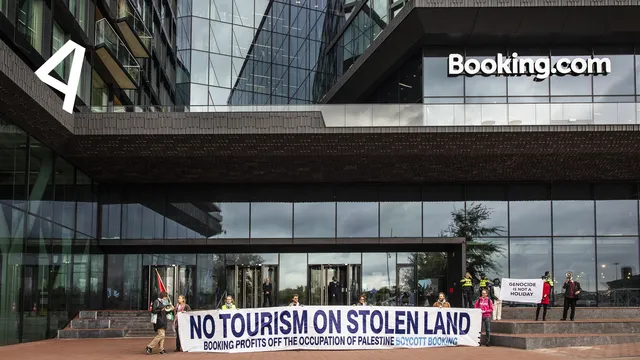Internal Struggle at Booking: Hundreds of Employees Protest Against Rentals in the West Bank

For years hundreds of Booking employees have been raising internal concerns about the company’s rental policy in the West Bank. Internal unrest is growing over the rental of accommodations in illegal settlements, according to an investigation by Argos.
Lees het nieuwsbericht ook in het Nederlands
_____
The Dutch company Booking.com offers dozens of hotels and apartments in these settlements, which are considered illegal under international law. Recently, the Dutch Parliament passed a motion to push for sanctions against settlers who build in the West Bank.
As early as 2018, Human Rights Watch warned that vacation accommodations in these areas make the settlements financially more attractive and therefore more sustainable. According to the human rights organization, they also contribute to more Israeli civilians moving into occupied territory.
Meanwhile, since the Gaza war, the number of Booking listings in occupied territory has only increased.
Internal Petitions and Protests
The criticism of Booking’s rental policy is now also coming from within the company. Over the past few years, multiple internal petitions have circulated within Booking, calling on the company to stop offering accommodations in illegal settlements. Each time, around 300 employees have signed these petitions. During “town hall” meetings, where employees can ask questions to CEO Glenn Fogel, the topic frequently comes up.
Employees argue that the rentals not only violate international law but also contradict Booking’s own Human Rights Statement. One petition states:"What is our human rights policy worth if it ignores the advice of the world’s most respected human rights organizations?" However, Booking moderators remove this petition from the company’s intranet. Employees also consider Booking’s policy discriminatory."Palestinians can’t even visit these Booking-listed apartments," one employee notes.
Despite Booking’s internal responses to these concerns, nothing changes. The company maintains that it should not dictate where people can and cannot travel. As long as it is legal under Dutch, European, and U.S. law, Booking will continue offering accommodations. In internal communications, the company reiterates that its mission is to “help people experience the world.”
Internal communication
A former employee is cynical about this stance:"It’s always about ‘making it easier for people to experience the world’ and then that’s positioned against international humanitarian law. What the fuck?"
Argos reviewed internal communications and spoke with current and former employees. CEO Fogel consistently defends company policy during meetings, but in response to employee questions, he also hints at another motivation: Airbnb.
Fogel: “Our competitor was severely impacted by their decision to withdraw because this was seen as a very negative signal in the United States. (...) So, if we’re talking about what could damage a brand’s reputation: withdrawing would have a very negative impact on the company. "But," he adds, "that not the why we’re not doing it."
In 2018, following the Human Rights Watch report, Airbnb removed its listings in the West Bank. The decision led to lawsuits from Israel and the U.S., after which Airbnb reversed its decision six months later.
Booking.com
In response to Argos, Booking.com emphasized that the company believes in travelers’ autonomy and does not want to dictate where they can go. “Our approach is consistent worldwide. In conflict areas, we add information to our platform so travelers can make an informed choice”, a spokesperson said in a written statement.
The company states that it only removes accommodations when legally required, such as through sanctions. Additionally, Booking claims it is “closely monitoring the situation.”
Regarding employee petitions, Booking says it is proud of its “open corporate culture” and that employees are free to express concerns. At the same time, the company defends its decision to remove an internal post about a petition in 2021, arguing that it was done to prevent the debate from “turning into a divisive and politically charged discussion.”
However, many critical questions remain unanswered. Booking does not address how its policy aligns with its own human rights principles. Nor does it respond to the question of whether all accommodations are accessible to Palestinians.
Watch "Booking in de Westbank" on Sunday 23th of March at 11.40PM on NPO2.